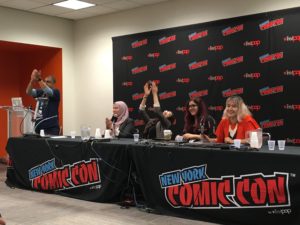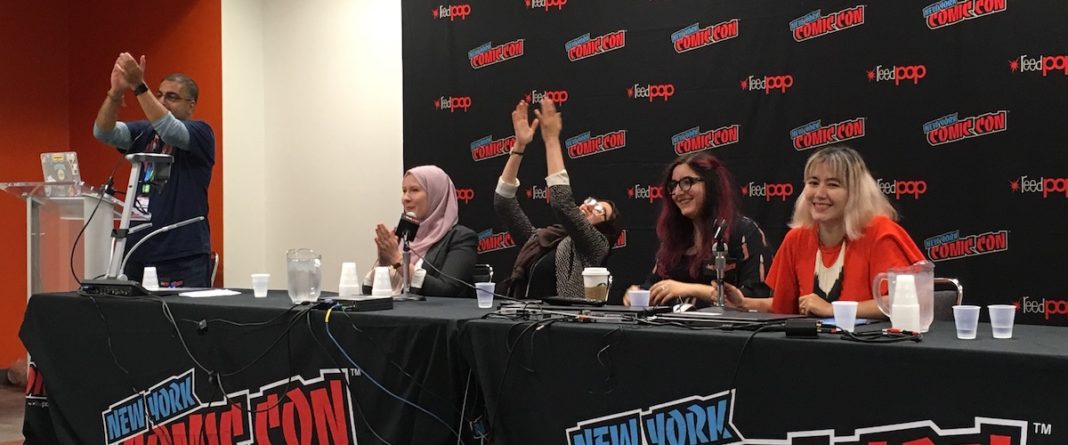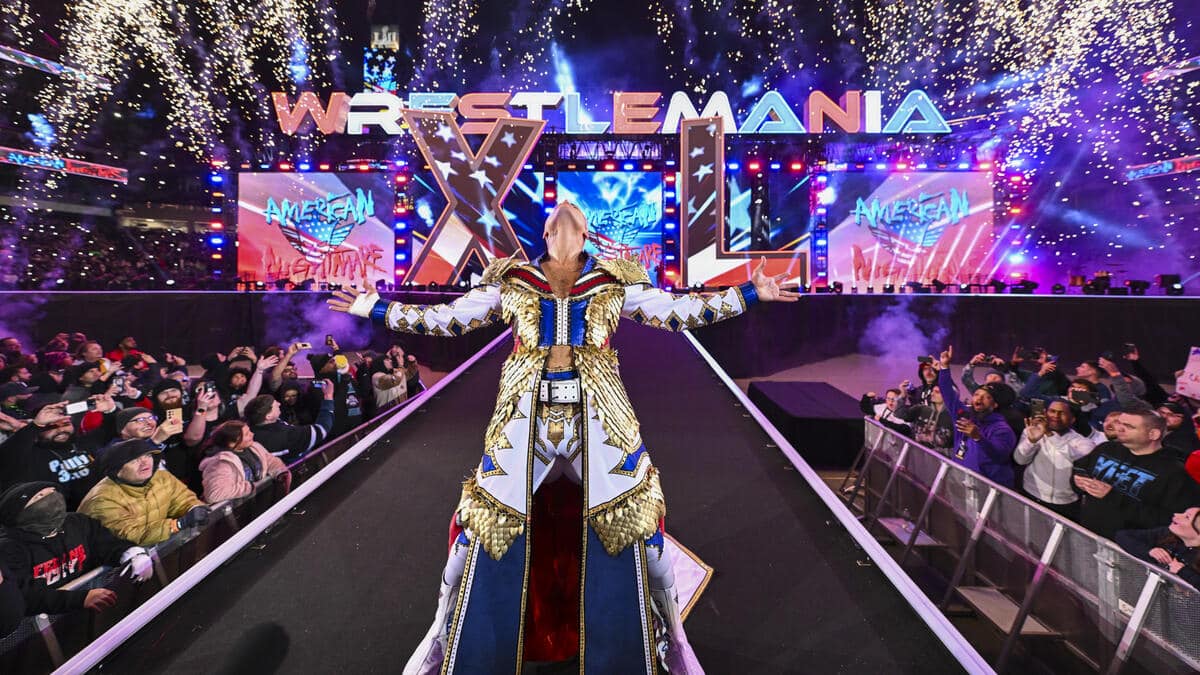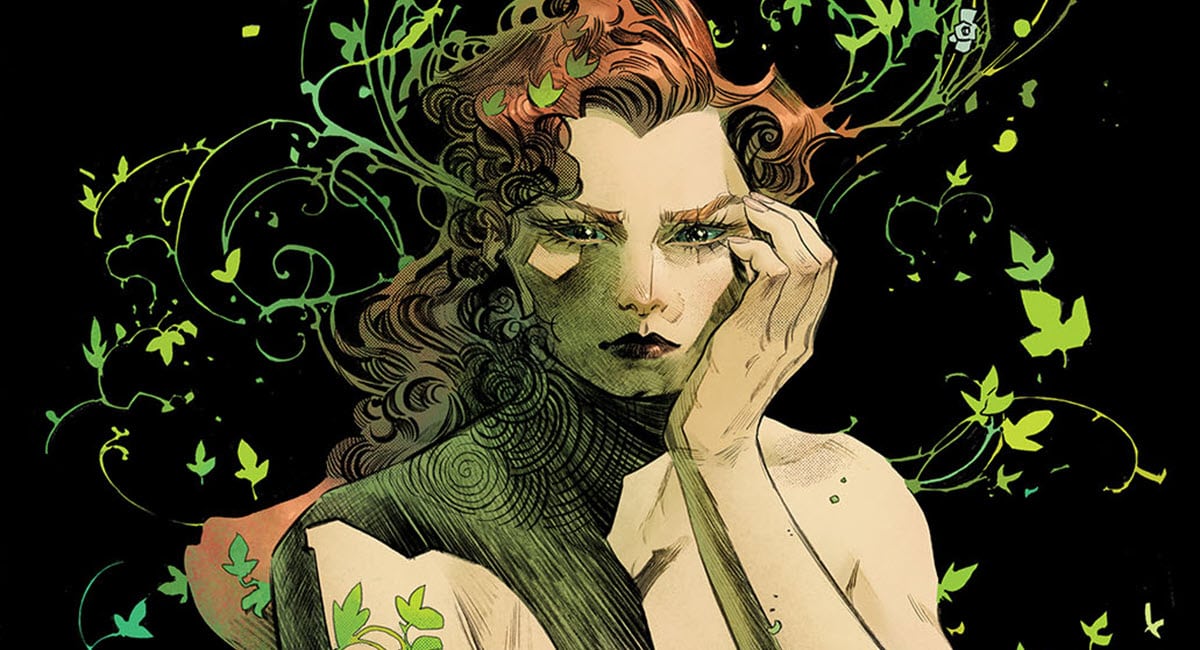By Adam Karenina Sherif

The conversation was exceptionally well-structured and included clear frameworks, definitions and examples. As well as some series critical analysis, the panelists also spoke with honesty and meaningful self-reflection on their own struggles as creators addressing their respective cultures and identities.
Rashid began proceedings by citing theorist Edward Said and describing Orientalism as “a Western style for dominating, restructuring, and having authority over the Orient.” The othering that Orientalism does to Asian and Arab cultures, he continued, is “a tool of colonization, a means of convincing people that some people are less worthy of their humanity.” The panellists nodded along, taking this definition as their starting point for discussion.
In turn, each panelist presented some examples of where we see Orientalism in comics. Rashid mentioned the all-encompassing and highly problematic “Siancong” war recently seen in the pages of History of the Marvel Universe, C.B. Cebulski’s ‘Akira Yoshida’ yellowface act, and the 2011 graphic novel Habibi.
Shammas shared her personal experience with Craig Thompson’s work: “When I encountered Habibi in college, I realised I had to dedicate my career to undoing it. Thompson really revels in the violence he depicts, and tries to highlight the beauty of a character’s survival in that context — but the Middle East doesn’t really look like this.”
Wilson added that with Orientalism, a key question is always, “who is the audience?” and that it can be difficult to tell stories for a Western audience “because they will often latch onto things they already know.” This means that works which deal in stereotypes, tropes, inauthenticity and fetishism can unfortunately have mass appeal.
Alfageeh pointed specifically to Marjane Satrapi’s most famous work, not because of the work itself, but because of its reception. “I have a problem with the way people engage with Persepolis,” Alfageeh said. “It’s particularly popular with French audiences, a demographic that is especially hostile to Muslim women. It works for them because it’s a narrative that sees the protagonist rejecting some aspects of Islam in her journey.”
Discussing the difficulties for a reader in identifying Orientalism in comics, the panel unanimously emphasised the importance of listening to the responses of the relevant communities.
“Listen to the people in those spaces, listen to people who are doing the work. Twitter is free, and you can listen in on those community conversations,” said Alfageeh. She also noted as a positive that there’s a major call right now with media and cultural criticism for reviewers with relevant experience and connection to the material to be the ones assigned for coverage.
Shammas lamented that in response to criticism, “there’s often a defensiveness and doubling-down which is a huge problem,” particularly where creators then place emphasis on having had good intentions.
The question of intentions is one which totally misses the more crucial concern of the lens through which someone is working, and indeed perceiving the world. Asked about how creators can avoid perpetuating Orientalism in comics, Wilson had heavy truths which came out of her own personal experience: “The bad news for white creators is that you can’t. Anything filtered through the Western gaze, even if it’s positive, is still part of the system of Orientalism. No matter what your intentions are as an author. And that’s really changed how I think about my own writing.”
Henderson mentioned Gene Luen Yang’s work in this vein as well: “American Born Chinese has Yang reflecting on his relationship with China through the lens of a very Christian message. And in Boxers & Saints, the Boxers are depicted as purely violent, while the Saints [Christians] are given more respect and humanity.”
When Shammas then brought up the idea of internalised bias, the panel moved into some incredibly nuanced and self-reflective territory. It was the kind of conversation that rarely gets space in more general discourse, and it proved particularly resonant with the audience. Shammas put it that “conversations around representations are so important, because we all internalise what we see. The only way to navigate is to be honest about it: we’re not exempt from the tropes and stereotypes we’ve been given.”
Speaking about the diaspora experience, Alfageeh put it that “as much as I want to represent, I do have to hyphenate: I’m an Arab-American. So even when I’m coming at material that’s related to me, I have to admit I’m slightly outside of it. And at the same time, I’m not allowed to make ‘American’ stories. What happens when you’re caught in the middle?”
Shammas followed up with a wonderfully succinct reflection, adding, “I’m Arab-American, and everything that I am exists in that hypen.”
An interesting and thoughtful exchange opened up between Alfageeh and Henderson on the role of empathy. Henderson said, “you have to look at the biases that prevent you from having empathy for other experiences.” Alfageeh responded by asking, “Is empathy really enough? What’s the goal there? Accuracy?” It’s a step towards “resisting positioning people as other, and finding a connecting starting point. It may not be accurate, but at least you’re thinking about that person as a person.”
The panel unanimously agreed that the limits of empathy are precisely why #ownvoices is so crucially important. Limitations and, of course, questions of access.
“I see opportunities for some people to tell any story, even when they’re really not the best, or most authentic voice for it,” said Alfageeh.
Shammas agreed that “this is why #ownvoices is so important. I feel it’s on these people with power, position and privilege to resist these opportunities and offer it to someone who might be better placed for it.” Shammas raising this bigger, more structural concern led to an especially profound moment as G. Willow Wilson explained some of the context to why she gave up her writing duties on Ms. Marvel.
“This is something I think about a lot,” she said, “and part of the reason I stopped writing Ms. Marvel when I did was because I started getting job offers that made me nervous. I would say ‘I’m not a good fit for this, but here’s a list of names of people who would be.’ I began to become concerned, because when something is good, there’s a tendency to make everything irreducible to that. And I wanted other people to get the chance to tell other American Muslim stories with different and more complex perspectives than I could. So I put myself out of a job, because the community is more important. White people have to be prepared to give up stuff — not just stuff that’s easy, but stuff you care about.”
She said that she took this difficult decision, prayed for a sign and was shortly thereafter offered Wonder Woman by DC Comics. It was a powerful piece of testimony from one of the biggest names in comics, delivered in a really grounded and straightforward fashion.
Finally, the panel concluded with some reflections on diversity and inclusion initiatives, and the pressures that go along with them for marginalised creators. Henderson stressed that doing the work meaningfully was important, regardless of the publishing context: “Do it right, and don’t let people mess with you. Make it work in a way that feels right to you.” She shared a story about an offer to do a graphic novel set in Ancient China where, to every objection she raised around realism and authenticity, the publisher replied, “Oh, it’s fantasy so it’s fine.” In the end, Henderson understood that “what they wanted was essentially to set the story in America, but with dragons on shit.” She didn’t take the project.
Likewise, Alfageeh said, “I understand the enthusiasm around diversity initiatives, but we need to do this right — not fast.”
Shammas wrapped things up with an affirmation that stories of marginalised characters and other cultures do not need to be monolithic representations. “You have to ask yourself,” she said, “if you’re devaluing your own stories. And to realise that your stories do matter, and that they don’t have to be singular.”
This panel was a consistently poignant and meaningfully nuanced conversation, the likes of which rarely gets sufficient airtime in mainstream comics discourse. Each panelist brought an incredible degree of honesty and brilliant critical insight. And, some excellent news moving forwards is that Shammas and Henderson are working on a pitch together.







